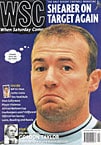 Sam Hammam's players have ruffled a few feathers, but their team spirit and his shrewd management have kept Wimbledon above water longer than anyone expected
Sam Hammam's players have ruffled a few feathers, but their team spirit and his shrewd management have kept Wimbledon above water longer than anyone expected
It is rare for all the newspapers, tabloid and broadsheet alike, to run the same picture on their sports pages. But it happened at the end of February when they all featured an image of a middle-aged businessman sitting in a puddle. Wimbledon’s former owner Sam Hammam had just sold his remaining 20 per cent stake to the Norwegian millionaires who took control of the club last year. The players marked the event by soaking him at the training ground. As has often been the case with Wimbledon, it was probably fun for those directly involved.
Neutrals might find it hard to imagine a less appealing trio of personalities than the old Crazy Gang mainstays John Fashanu, Vinnie Jones and Dennis Wise, but the team spirit forged in part by Hammam himself has undoubtedly been a crucial factor in keeping Wimbledon at the top for so long and in the face of so much hostility. No other team gets routinely attacked with anything like the vehemence reserved for Wimbledon. The football on offer at Selhurst Park is no more ugly than might be seen elsewhere but reporters often seem to have composed their negative impressions before setting foot in the ground. The attendance figure invariably features in any such diatribe, as though it were indication of the club’s unsuitability to exist at the top level.
Now, when promoted clubs routinely drop out of the Premiership after one season, it seems incredible that Wimbledon have not yet had a season when they have struggled to stay up or been in danger of the drop on the final day. Clubs with more money and stronger playing squads, Forest last year, Shef-field Wednesday this, have gone down in part because they were badly run by squabbling directors. Sam Hammam, for all his personal eccentricities, has provided stability in the boardroom since he first got involved with Wimbledon over 20 years ago. Hammam might have been guilty of self aggrandisement at times and he has received around £30 million from the sale of his controlling interest, but no one looking to make a buck stays with a small football club for 22 years, especially given the extra stresses brought about by the creation of the Premier League. Swindon and Oldham have all but collapsed after dropping out of the top level andWimbledon fans will be only too aware of the crisis afflicting their co-tenants at Selhurst Park. They will be wondering too what Hammam’s successors might have in mind for their club.
The owners seem keen to balance the books by selling players – an attempt to offload John Hartson to Spurs late last year appears to have precipitated the final breach with Hammam – and replacing them with cut price signings from their “other” club, Molde SK of Norway. Wimbledon are haemorrhaging money simply by groundsharing and they seem no nearer to finding a new stadium nearer their old home in the borough of Merton; potential escape routes, to Dublin and Scotland, have been blocked by the football authorities.
There is another reason why relegation might prove catastrophic for Wimbledon. Two years ago the Nationwide League approved a change to their rulebook which will mean that a club unable to meet membership criteria could be expelled if 50 per cent of clubs, as opposed to the previous 75 per cent, decided to vote against them (just recently the wrangle over their new stadium placed Barnet under real threat of being kicked out). League rules also state that clubs who drop out for financial reasons will not be replaced unless membership falls to below 70 clubs.
It is expected that the Premier League will soon be cut down to 18 to allow the top clubs more time to prepare for their Champions League phase two group matches with the fourth-best teams in France and Spain. Extra places would then have to be found in the Nationwide League for the two clubs dropping out of the top division. Apparently the League hopes to achieve this by “natural wastage”. Should Wimbledon drop out of the Premier League and have escalating financial problems as a result, they should not expect sympathy from lower division clubs on the lookout for someone to sacrifice.
Responding to talk of merger with their current landlords back in 1992 Sam Hammam said: “I’d rather die and have vultures eat my insides than merge with Crystal Palace.” Like some of the Crazy Gang’s antics his comment is unlikely to have made much of an impression on two sober Norwegian businessmen.
From WSC 158 April 2000. What was happening this month